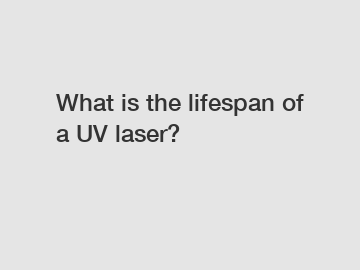What is the lifespan of a UV laser?
What is the Lifespan of a UV Laser?
In today's technologically advanced world, lasers have become an integral part of various industries and applications. One such type of laser is the UV (ultraviolet) laser, which is known for its high precision and accuracy. However, like any other piece of equipment, UV lasers also have a limited lifespan. In this article, we will explore what contributes to the lifespan of a UV laser and factors that can affect its longevity.
Understanding UV Lasers.

UV lasers are a type of laser that emits ultraviolet light, which is a short wavelength of light on the electromagnetic spectrum. They are widely used in industries such as electronics, semiconductor manufacturing, medical, and scientific research. UV lasers have the unique ability to perform highly precise tasks like micro-cutting, drilling, and 3D printing.
Factors Affecting the Lifespan of UV Lasers.
1. Laser Type:
- Solid-state UV lasers: Typically have a longer lifespan compared to gas or liquid-based lasers.
- Excimer UV lasers: Have a relatively shorter lifespan due to the nature of the excimer gas used.
2. Duty Cycle:
- The duty cycle refers to the ratio of the total operating time to the total downtime of the laser. Continuous usage at maximum power levels can significantly decrease the lifespan of a UV laser compared to intermittent usage.
3. Cooling System:
- UV lasers generate a significant amount of heat during operation. A well-functioning cooling system is crucial to maintain optimal operating temperatures and prevent premature failure of the laser components.
4. Maintenance and Cleaning:
- Regular maintenance and cleaning of the laser system can significantly prolong its lifespan. This includes cleaning of optical elements, checking for alignment issues, and replacing worn-out parts.
5. Operating Environment:
- UV lasers are sensitive to environmental conditions such as temperature, humidity, dust particles, and vibrations. It is important to operate the laser within specified environmental parameters to ensure its longevity.
6. Quality of Materials:
- The quality of the materials used in manufacturing the UV laser can have a significant impact on its lifespan. High-quality components tend to be more durable and have a longer operational life.
7. Laser Power:
- Higher laser power levels can lead to faster degradation of the laser components, resulting in a shorter lifespan. Using the laser at appropriate power levels and avoiding unnecessary power spikes can help extend its lifespan.
Closing Paragraph:
In conclusion, the lifespan of a UV laser can vary depending on various factors, including the laser type, duty cycle, cooling system, maintenance, operating environment, quality of materials, and laser power. By ensuring proper maintenance, adhering to operating guidelines, and using high-quality lasers, it is possible to maximize the lifespan of a UV laser. If you have any further questions about UV lasers or need assistance with laser-related applications, please feel free to contact us.
[Contact us for more information on UV laser lifespan, maintenance, or other related queries.].
Are you interested in learning more about Semi-automatic X-Ray Inspection Machine, PCB Plastic Container, Lamination Automation Exporter? Contact us today to secure an expert consultation!

Comments